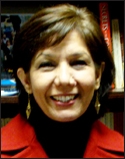Passport to the World
Claudia Roden "Gefilte Fish and Couscous"
Katherine Bullock “Women and Islam”
Katherine Bullock “Women and Islam”
Katherine Bullock “Women and Islam”
Mina Yazdani “Religious Diversity in Iran”
Not only is the Middle East the birthplace of three of the world’s great religions, Judaism, Christianity, and Islam, but it is also home to other less well-known religions. Dr. Mina Yazdani will discuss Iran and its ties to the lesser known religions, Zoroastrianism, and the Baha’i Faith, and the mystical interpretation of Islam, Sufism.
Dr. Yazdani is an Assistant Professor in the Department of History at Eastern Kentucky University. She received her Ph.D. from the Department of Near and Middle Eastern Civilizations at the University of Toronto. Her thesis was entitled, Religious Contentions in Modern Iran, 1881-1941.” Her current research interests focus on Modern Iran and the Islamic World. She has published widely in both English and Persian.

Mina Yazdani “Religious Diversity in Iran”
Not only is the Middle East the birthplace of three of the world’s great religions, Judaism, Christianity, and Islam, but it is also home to other less well-known religions. Dr. Mina Yazdani will discuss Iran and its ties to the lesser known religions, Zoroastrianism, and the Baha’i Faith, and the mystical interpretation of Islam, Sufism.
Dr. Yazdani is an Assistant Professor in the Department of History at Eastern Kentucky University. She received her Ph.D. from the Department of Near and Middle Eastern Civilizations at the University of Toronto. Her thesis was entitled, Religious Contentions in Modern Iran, 1881-1941.” Her current research interests focus on Modern Iran and the Islamic World. She has published widely in both English and Persian.

Mina Yazdani “Religious Diversity in Iran”
Not only is the Middle East the birthplace of three of the world’s great religions, Judaism, Christianity, and Islam, but it is also home to other less well-known religions. Dr. Mina Yazdani will discuss Iran and its ties to the lesser known religions, Zoroastrianism, and the Baha’i Faith, and the mystical interpretation of Islam, Sufism.
Dr. Yazdani is an Assistant Professor in the Department of History at Eastern Kentucky University. She received her Ph.D. from the Department of Near and Middle Eastern Civilizations at the University of Toronto. Her thesis was entitled, Religious Contentions in Modern Iran, 1881-1941.” Her current research interests focus on Modern Iran and the Islamic World. She has published widely in both English and Persian.

“The Arab World and American Democracy”
“Specters of War” examines the influence of post-9/11 American military interventions in the Middle East on the production of both American and Arab literature. Focusing on images of ghosts, spectral illusions, the undead and the undying, the talk attempts to locate zones of inter-textual contact where contemporary American and Arab literary voices move past mutual redactions and engage one another’s respective cultural realities. The goal is to both introduce Arab literary voices into the conversation about America’s presence in the Middle East and to interrogate the haunting presence of the Middle East in contemporary American literature. Works discussed will include Ali Bader’s The Tobacco Keeper, Hassan Blasim’s The Corpse Experiment and Other Stories of Iraq, Mohamedou Ould Slahi’s Guantanamo Diary, Theo Padnos’s “My Captivity,” Phil Klay’s Redployment, and Ross Ritchell’s The Knife.
“The Arab World and American Democracy”
“Specters of War” examines the influence of post-9/11 American military interventions in the Middle East on the production of both American and Arab literature. Focusing on images of ghosts, spectral illusions, the undead and the undying, the talk attempts to locate zones of inter-textual contact where contemporary American and Arab literary voices move past mutual redactions and engage one another’s respective cultural realities. The goal is to both introduce Arab literary voices into the conversation about America’s presence in the Middle East and to interrogate the haunting presence of the Middle East in contemporary American literature. Works discussed will include Ali Bader’s The Tobacco Keeper, Hassan Blasim’s The Corpse Experiment and Other Stories of Iraq, Mohamedou Ould Slahi’s Guantanamo Diary, Theo Padnos’s “My Captivity,” Phil Klay’s Redployment, and Ross Ritchell’s The Knife.

